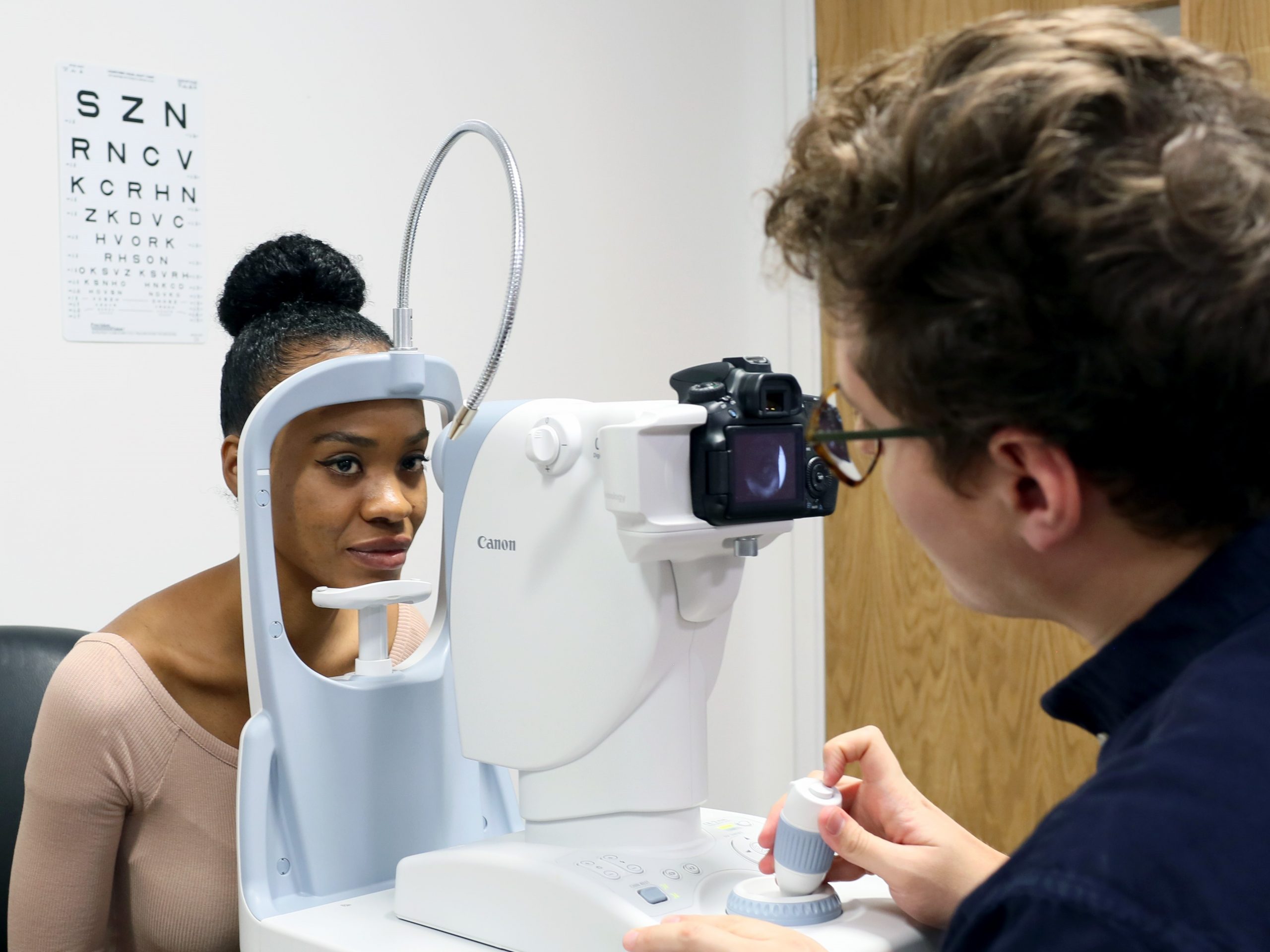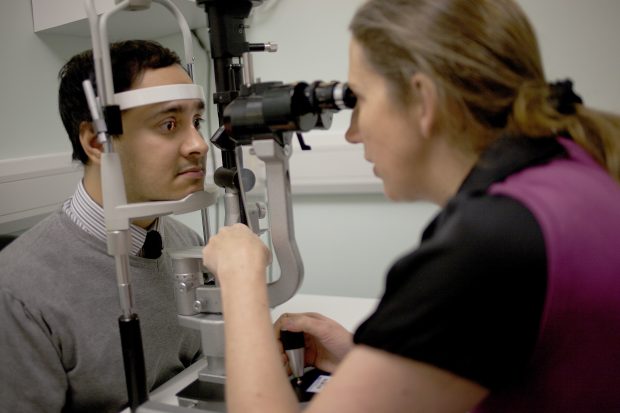Health
Three reasons why eye exams are important

The Holy Bible says that “eyes are the window of the soul”, and in interpretation, we can say that the eyes are truly an important part of the body – just as windows are for a building.
If you cannot remember the last time you went for an eye examination or have never undergone one, please link up with this article.
Since eyes are a key component of the body, we have the responsibility of taking care of our eyesight and managing them responsibly. Hence irrespective of fear, ignorance, misinformation, or financial reasons, you should really re-consider including periodic eye examinations in your itinerary.
Also, eye examinations are not restricted to only people who wear recommended glasses, it is still necessary to attend eye examinations periodically. This might seem bizarre and even but is good practice.
Eye Doctors Can Detect Eye Complications
It’s possible you have developed eye defects even if you currently see clearly. In fact, even though you score highly during your eye test, doesn’t also mean you’re in the clear.
This is because most eye defects usually go unnoticed in their early stages, just like with High Blood Pressure and other medical conditions, early detection is best.
Committing to periodic eye examinations is also a sure way to provide specialists with a track history of your eye for future examinations. This track will be used as a point of reference for subsequent examinations. This way, should a problem be diagnosed in the future, the specialist in charge can refer back to your older reports to spot the precise time the condition developed.
It Gives Eye Doctors The Chance You Educate You On Eyecare
Visiting an eye clinic for an examination usually puts a patient at the advantage of learning important tips on eye care from an eye doctor.
Tips like; eye protection practices under direct sunlight [UV/UA rays], when using LED Screens, proper diet [e.g. including foods rich in Vitamin A like carrots, tomatoes etc], and exercises for the eyes are a few useful and helpful tips that not only benefit an individual but prolong the eyesight of that individual.
In addition to this, specialists can even prescribe drugs, ointments, lenses which can help keep your overall eye function in great condition.
Eye Doctors Can Detect Other Diseases
Eye diseases or defects are not the only things eye specialists can spot during eye examinations. According to a publication by The Eye Associates, diseases like blood pressure, diabetes, leukemia, and high cholesterol, are examples of health problems which can be detected during standard eye tests.
“This is because the eye is the only place where blood vessels can be viewed in their natural state without a surgical procedure.” the publication explains.
A great advantage of this situation is that other health issues can be detected early to investigate further by specialists and treated before complications.
To recap, eye examinations aren’t meant only for people who wear glasses but for everyone.
One of the reasons why some people shun eye examinations is financial reasons — that is, eye services being too costly. Although truthfully, some eye clinics can be pretty pricey, with the right information from research and asking the right questions, you most likely will come in contact with more affordable eye care services.
HMO services also cover eye examinations so make sure to double-check with your HMO provider if your insurance covers eye care. If it doesn’t, try working out a system including eye cafe.
What has been your most memorable experience getting your eyes examined? Would you mind sharing this in the comment section?
Health
NAFDAC warns against purchase of counterfeit anti-malaria drugs

The National Agency for Food and Drug Administration and Control (NAFDAC) has raised the alarm over the circulation of “counterfeit” Paludex tablets and suspensions in Nigeria.
The agency said the drugs, labelled as Paludex (Artemether/Lumefantrine), are manufactured by Impact Pharmaceutical Ltd, and Ecomed Pharma Ltd, Enugu and marketed by MD Life Sciences Ltd, Enugu.
The statement said laboratory tests conducted by a WHO-prequalified laboratory in Germany and NAFDAC revealed that the products contain zero percent active pharmaceutical ingredient (API), rendering them ineffective and potentially harmful.
NAFDAC warned that the products are not on its registered database and all NAFDAC registration numbers stated on the products are false.
“Genuine Artemether/Lumefantrine tablets or suspension is a combination of the two medications Artemether and Lumefantrine used to treat acute, uncomplicated malaria in adults and children,” the statement reads.
“The illegal marketing of medicines or counterfeit medicines poses a great risk to the health of people; by not complying with the regulatory provisions, the safety, quality, and efficacy of the products are not guaranteed.
“Also, poor-quality pediatric formulations or medicines in general have the potential of causing treatment failure when the API content is below the prescribed dose.
“All NAFDAC zonal directors and state coordinators have been directed to carry out surveillance and mop up the falsified products within their zones and states.
“NAFDAC implores distributors, healthcare providers, and patients to exercise caution and vigilance within the supply chain to avoid distribution, administration, and use of the products.
“All medical products must be obtained from authorized/licensed suppliers. The products’ authenticity and physical condition should be carefully checked.”
Health
Less sugar in a child’s first 1000 days reduces risk of chronic disease, study says

A new study has found that reducing the amount of sugar children get in the womb and as toddlers can protect them against diabetes and high blood pressure in adulthood.
Published in the journal Science, the research reveals a critical period for healthy nutrition in the first 1,000 days of a baby’s life — from conception to age two.
The study found that cutting sugar intake in this window decreased the type 2 diabetes risk by about 35% and the risk of high blood pressure by roughly 20%. The researchers also discovered a delay in disease onset of four and two years, respectively.
The research team anaylsed data from before and after the end of the United Kingdom’s world war II-era sugar rationing in September 1953.
In January 1940, the UK government began food rationing to ensure fair shares for all during the wartime shortage.
Access to sugar, fats, bacon, meat and cheese was limited. When the rationing of sugar and sweets ended in September 1953, the average adult’s daily sugar consumption nearly doubled almost immediately, from about 40 grams to 80 grams.
Analysing the UK BioBank database of 60,000 people, the scientists compared health in middle age for 38,000 people conceived and born during rationing and 22,000 people conceived soon afterward.
The analysis showed a 30% reduction in the risk of obesity among sugar-rationed babies.
The study by the team at the University of Southern California also found that the risk of type 2 diabetes and high blood pressure increased with age. However, it increased faster in those conceived after sugar-rationing ended.
The results showed type 2 diabetes started on average four years later in adult life where there had been sugar-rationing during early childhood, and blood pressure two years later.
There was a 35% reduction in type 2 diabetes for those babies conceived during sugar rationing and a 20% reduction in high blood pressure.
“Sugar rationing created an interesting natural experiment,” said Tadeja Gracner, the study lead author and a senior economist at the Center for Economics and Social Research at the University of Southern California.
“We all want to improve our health and give our children the best start in life, and reducing added sugar early is a powerful step in that direction.
“With better information, environment and the right incentives, parents can more easily reduce sugar exposure, for kids and themselves.”
Also speaking, Keith Godfrey, a professor from the University of Southampton, said: “This is convincing new evidence, providing further support that reducing exposure of the unborn baby and newborn infant to sugar has lasting benefits that include lowering the risk of diabetes and high blood pressure in later adulthood.
“The findings are in keeping with our research showing lower rates of obesity in the children of mothers who eat low glycaemic index foods during pregnancy that are digested and absorbed more slowly, causing a slower rise in blood sugar levels.”
A previous study also suggested that high sugar intake during pregnancy may affect a child’s intelligence.
Health
Five health benefits of aloe vera

Aloe Vera is a spiky succulent plant that grows naturally in dry, tropical climates like Africa, Asia, Europe, and southern and western parts of the United States. Over the years, this scrubby and pointy plant has been cultivated for its medicinal purposes.
Here are the health benefits you get from aloe vera as gel and juice.
- Aids digestion
Aloe vera, particularly aloe vera juice, has been proven to be a natural laxative.
The outer part of this plant contains a compound called anthraquinone glycosides which has laxative effects.
A study discovered that this compound can help relieve constipation while another research found that aloe vera could help reduce the symptoms of gastroesophageal reflux disease (GERD) — a digestive disorder that often results in heartburn — and irritable bowel syndrome.
However, when trying aloe juice for constipation for the first time, consume little amount of it.
- Reduces blood sugar levels
Both the gel and juice of aloe vera can help lower and control one’s blood sugar levels.
Several studies have indicated that taking aloe vera juice has some potential benefits for people with prediabetes and type 2 diabetes due to its effect on glycemic control.
- Rich in antioxidants
Aloe vera gel contains powerful antioxidants called polyphenols, which also have anti-inflammatory effects.
Antioxidants are important to health as they protect your body from damage caused by free radicals. These antioxidants have benefits ranging from reducing one’s risk of cardiovascular diseases to improving the immune system.
Aloe vera also has antibacterial and antiviral properties which is why it is used to treat and relieve burns and wounds.
- Promotes dental health
Due to its antibacterial properties, aloe vera juice and mouthwash improve various dental and oral conditions.
Aloe vera mouthwash is effective in reducing dental plaque. A study also showed that aloe vera mouthwash help reduces gum inflammation in people who had recently undergone tooth surgery to remove plaque.
- Skincare
Aloe vera is perhaps one of the most widely used herbal remedies for topical skin conditions. This is because the gel-like components of the plant are known to heal the skin from a variety of minor ailments.
This plant is also a natural moisturizer that helps soothes dry skin. Its anti-inflammatory properties also make it a potential treatment for skin conditions like burns, acne, and eczema.
Aloe vera also helps reduce the appearance of blemishes and wrinkles.
A 2009 study of 30 females over the age of 45 also prove that taking oral aloe vera gel increased collagen production and improved skin elasticity over 90 days.
-

 News1 week ago
News1 week ago‘I’ll live with this trauma all my life’ — Tijjani Babangida opens up on losing family in car accident
-

 News6 days ago
News6 days agoNaseni’s Executive Vice Chairman, Khalil Suleiman Halilu, Named 2024 Winner Of Daily Global Newspaper Conference Series Award For Science, Technology, Innovation, And Infrastructure
-

 Relationships1 week ago
Relationships1 week agoFour dating tips for single mum
-

 Relationships5 days ago
Relationships5 days ago‘I wish I met you before the wrong person’ – says Portable’s baby mama, Honey Berry, as she flaunts new lover
-

 Politics1 week ago
Politics1 week agoIbrahim Kashim resigns as Bauchi SSG
-

 Entertainment1 week ago
Entertainment1 week agoApostle Femi Lazarus, others top Spotify most streamed podcasts in Nigeria, Kenya, South Africa
-

 News5 days ago
News5 days agoLagos state government shuts Lord’s Chosen Church, businesses across Lekki, VI, others over noise, environmental infractions
-

 Politics1 week ago
Politics1 week agoRep seeks increased participation of women in politics



















